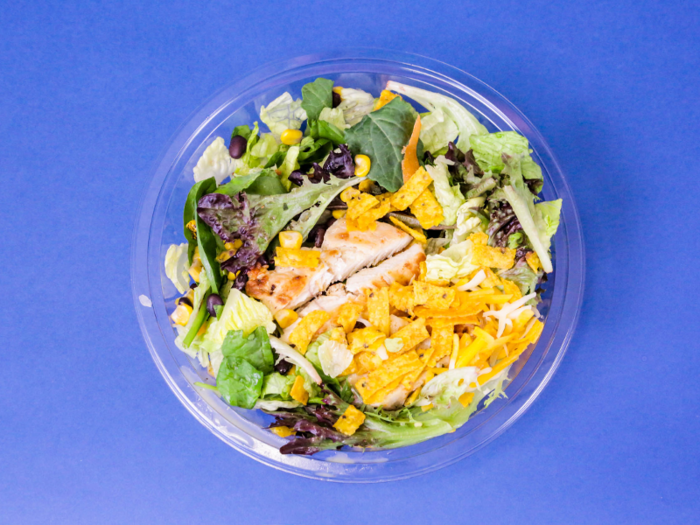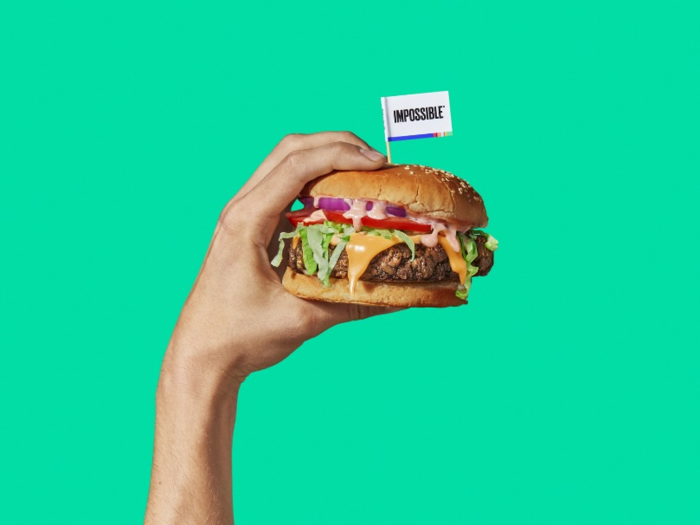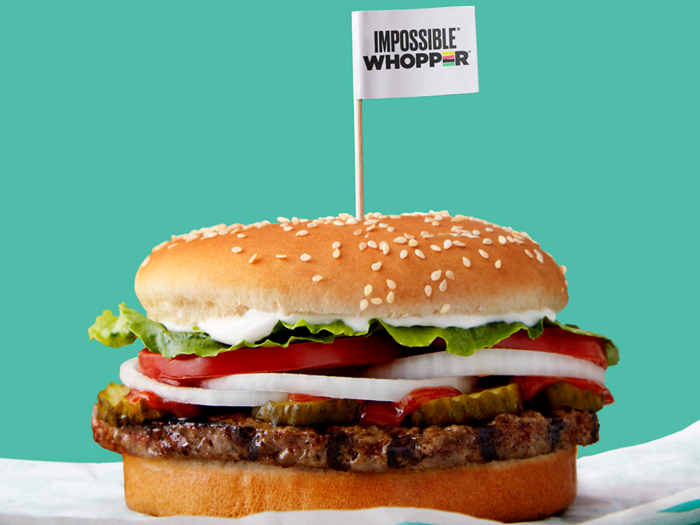- Home
- slideshows
- miscellaneous
- 5 reasons why Impossible Foods and Beyond Meat are taking over fast food while veggie burgers failed
5 reasons why Impossible Foods and Beyond Meat are taking over fast food while veggie burgers failed
They taste like real meat.

Nutritionally, they're similar to classic burgers — and don't try to be something healthier.

Cowen notes that unlike many veggie burgers, plant-based menu items have similar protein levels to the menu items they're replicating.
Growing protein sales and the rise of high-protein diets mean that customers are prioritizing protein over cutting calories — good news for Impossible Foods and Beyond Meat.
Further, mimicking fast-food menu items means that the new wave of veggie burgers do not need to market themselves as healthier options. In years past, many vegetable-based dishes have been either literally or figuratively forced into the "better-for-you" section of the menu.
Customers may say they want healthier options, but when it comes time to order, many end up wanting fries instead of a side salad. In 2013, for example, McDonald's doubled down on meat after its attempts to win over customers with salads failed.
"I don't see salads as being a major growth driver in the near future," McDonald's then-CEO Don Thompson said at the time.
Marketing is centered on sustainability, as Gen Z worries about climate change.

Instead of focusing on health or convincing customers to give up meat, Impossible Foods and Beyond Meat are emphasizing sustainability.
"Sustainability is increasingly more relevant as consumers, especially Millennials and Gen Z, have become more aware of the damage that food production has caused to the planet," Barclays wrote in a report in May.
Impossible and Beyond are presenting themselves as a solution to growing global beef consumption — one of the leading environmental threats to the planet. Barclays notes that cows contribute more to global greenhouse gas emissions than cars, with the average cow emitting up to 500 liters of methane every day.
Cowen found that a sense of social responsibility was driving purchases of both the Beyond Burger and Impossible Burger. 12% of people who had tried either burger said that their primary reason for trying the burger was social responsibility.
"While this trails health and curiosity, in our view this represents the most durable reason for growth in the plant-based category, given both brands focus their missions on the environmental benefits of having fewer animals raised for food purposes," the report states.
Read more: Plant-based fast food isn't any healthier than the originals — and that's the point
Buzz begets buzz.

Right now, curiosity is actually more likely to convince people to buy Beyond and Impossible products than a sense of social responsibility. 34% of people who have eaten an Impossible Burger said that the primary reason they tried the burger for the first time was curiosity; 29% of people said the same about their first time trying Beyond Burger.
This curiosity is linked to a number of other factors.
While veggie burgers have been around for decades, Impossible and Beyond have successfully marketed their products as something entirely new, with Cowen noting that plant-based offerings are in their nascent stages. This trendiness sets the new products apart from traditional veggie burgers.
Companies' promises that the products taste like real meat also help draw in skeptics and others eager to test the claim. Meat eaters were more likely to buy the products due to curiosity than vegetarians were, perhaps looking to call companies on their bluff.
Impossible Foods and Beyond Meat products have also become cultural icons in their own right, with the help of fast-food giants' marketing. For example, this Halloween, you can buy a sexy Beyond Burger costume at Yandy.
"We have quite a few vegetarians in the office so the thought around plant-based costumes was definitely part of our Halloween discussions this year," Yandy representative Chris Turk told Business Insider in an email.
Turk added that a merchandising manager watched Jim Cramer every night on CNBC "and apparently he is obsessed with Beyond Meat so it really stuck in her mind."
Read more: An infamous lingerie brand is selling a sexy 'Beyond Burger' costume this Halloween
Fast-food chains are crucial partners.

Summer Anne Burton, the editor-in-chief of vegan magazine Tenderly, recently published an article in BuzzFeed News outlining the reasons why she and other people who don't eat meat for ethical reason feel uncomfortable with the rise of Beyond Meat and Impossible Foods.
"Money from wealthy investors is pouring into these new corporations, money is flowing between these new companies and the fast food brands whose major profit center is still dead chickens and cows, and money is coming in from curious consumers who are lining up for vegan KFC tenders and Impossible Whoppers," Burton writes.
Burton adds: "This new industry rises not because of us, but in many ways despite us."
Analysts are coming to similar conclusions — and they see this as a positive. By working with recognizable fast-food brands, plant-based products are poised to win over customers.
"While early, we believe restaurant operators that can extend branded, recognizable products to plant-based offerings will be the most successful, such as Burger King's Impossible Whopper," the Cowen report states.
Cowen notes that the inverse is also true. When a plant-based product represents a less popular or nonexistent menu item or category — such as the addition of a Beyond Burger to the menu at Tim Hortons, a chain that previously didn't sell burgers — it will do little to boost sales.
In other words, plant-based menu items are thriving primarily when they fit into a wider, existing fast-food ecosystem.
Ultimately, veggie burgers failed because they were either tacked onto fast-food menus or marketed as boring, better-for-you alternatives to meat. Impossible Foods and Beyond Meat are trying the opposite approach — mostly ignoring vegan and vegetarians, in favor of winning over meat eaters with trendy, limited-time offers.
It is a strategy that is taking over fast food in a way the veggie burger never did.
Popular Right Now
Advertisement